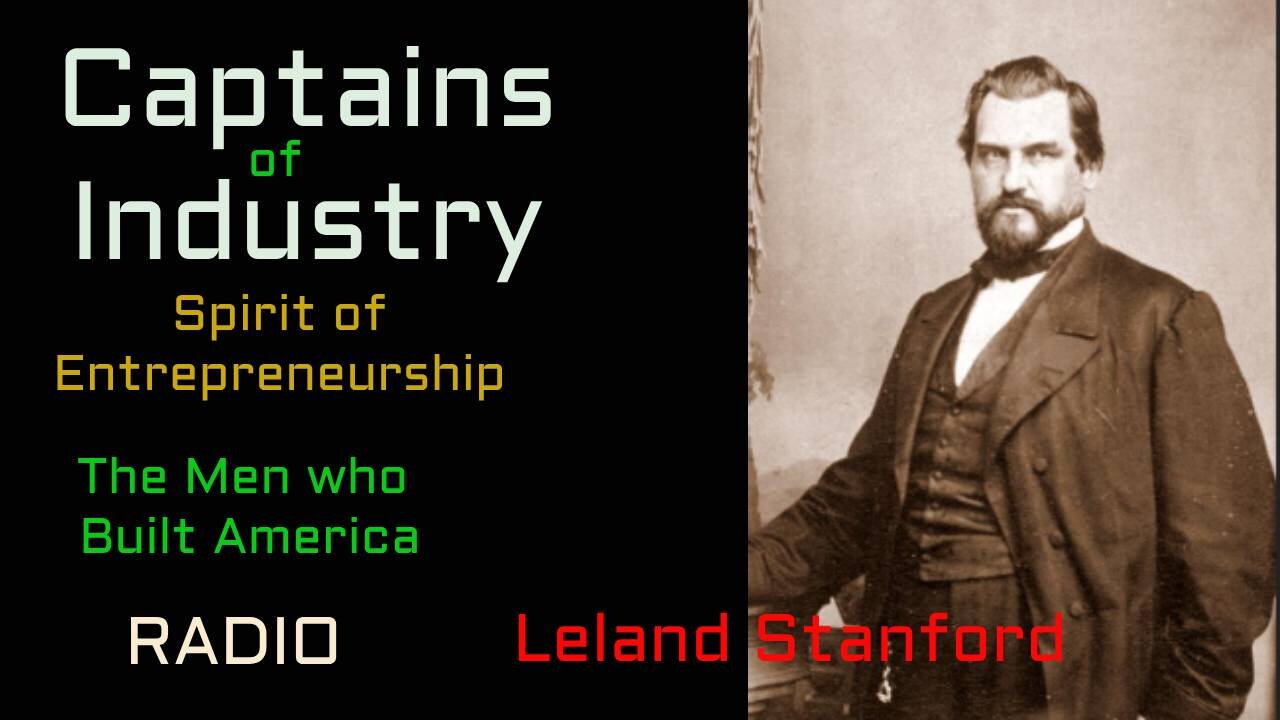Premium Only Content

Captainsof Industry (ep05) Leland Stanford
Amasa Leland Stanford (March 9, 1824 – June 21, 1893) was an American attorney, industrialist, philanthropist, and Republican Party politician from California. He served as the 8th Governor of California from 1862 to 1863 and represented the state in the United States Senate from 1885 until his death in 1893. He and his wife Jane founded Stanford University, named after their late son.
Stanford was a successful merchant and wholesaler who migrated to California during the Gold Rush and built a business empire. He was an influential executive of the Central Pacific Railroad and later the Southern Pacific railroads from 1861 to 1890, giving him tremendous power in the American West and leaving a lasting impact on California. He also played a significant role as a shareholder and executive in the early history of Pacific Life and Wells Fargo. He was the first Republican Governor of California. Stanford is widely considered a robber baron.
Early life and career
Leland Stanford was born in 1824 in what was then Watervliet, New York (now the Town of Colonie). He was one of eight children of Josiah and Elizabeth Phillips Stanford. Among his siblings were New York State Senator Charles Stanford (1819–1885) and Australian businessman and spiritualist Thomas Welton Stanford (1832–1918). His immigrant ancestor, Thomas Stanford, settled in Charlestown, Massachusetts, in the 17th century. Later ancestors settled in the eastern Mohawk Valley of central New York about 1720.
Stanford's father was a farmer of some means. Stanford was raised on family farms in the Lisha Kill and Roessleville (after 1836) areas of Watervliet. The family home in Roessleville was called Elm Grove. The Elm Grove home was razed in the 1940s. Stanford attended the common school until 1836 and was tutored at home until 1839. He attended Clinton Liberal Institute, in Clinton, New York, and studied law at Cazenovia Seminary in Cazenovia, New York, in 1841 to 1845. In 1845, he entered the law office of Wheaton, Doolittle, and Hadley in Albany.
After being admitted to the bar in 1848, Stanford moved with many other settlers to Port Washington, Wisconsin, where he began a law practice with Wesley Pierce. His father presented him with a law library said to be the finest north of Milwaukee. In 1850, Stanford was nominated by the Whig Party as Washington County, Wisconsin district attorney.
-
 1:26:16
1:26:16
Michael Franzese
14 hours agoMenendez Brothers Denied Parole – Newsom Holds Their Fate
76.4K38 -
 LIVE
LIVE
I_Came_With_Fire_Podcast
13 hours agoSecret Origins of Transhumanism & The New Atlantis
442 watching -
 LIVE
LIVE
GritsGG
1 day ago36 Hour Stream! Most Wins 3420+ 🧠
1,368 watching -
 1:12:40
1:12:40
Wendy Bell Radio
9 hours agoPet Talk With The Pet Doc
42.3K28 -
 LIVE
LIVE
FusedAegisTV
13 hours agoStreet Fighter 6 FINALS, CS2 Semifinals | $1,250,000 | Riyadh, Saudi Arabia EWC 2025 !estv
175 watching -
 40:42
40:42
SouthernbelleReacts
1 day ago $0.07 earned😂 American Pie (1999) Reaction | Iconic Teen Comedy, High School Chaos & 90s Nostalgia 🥧
18.7K2 -
 LIVE
LIVE
LumpyPotatoX2
4 hours agoBecome a HellDiver Today - #RumbleGaming
201 watching -
 4:52:02
4:52:02
Midnight In The Mountains
6 hours agoGaming w/ PER·SE·VER·ANCE | Sassy Saturday Fortnite | with the Midnights!
17.6K3 -
 LIVE
LIVE
shyboyking
4 hours agoThe Bots Of The Bots !!!😎
144 watching -
 24:06
24:06
True Crime | Unsolved Cases | Mysterious Stories
5 days ago $0.20 earnedShe Traveled Alone… and Never Came Back – 5 Mysterious Unsolved Cases (Part 6)
20K6